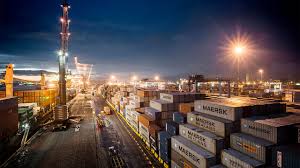Nigeria’s National Single Window Could Cut Manual Container Checks by 90%
Nigeria is preparing for a significant shift in how trade is managed at its ports. The National Single Window (NSW)—set to go live in early 2026—is expected to reduce physical container checks by about 90%.
Right now, import and export processes are slow, paper-heavy, and handled separately by many agencies. NSW will replace this with one digital platform where all trade-related activities can happen in one place. The goal is to make trade faster, simpler, and more transparent—helping Nigeria compete better in global markets.
What the National Single Window Is
The NSW is a central online hub that connects everyone involved in trade—government agencies, importers, exporters, freight forwarders, and others.
Here’s how it will help:
-
One entry point: Traders can submit all required documents once, through one platform.
-
Automated checks: A built-in risk management system will decide which containers need physical inspection, cutting unnecessary checks.
-
Real-time tracking: Traders can monitor their shipments and paperwork progress online.
-
Aligned with global standards: The system brings Nigeria’s trade processes closer to what’s used in major trading countries, lowering costs and delays.
What Leaders Are Saying
Tola Fakolade, Director and Coordinator of the NSW Project, said:
“The National Single Window will bring physical examinations at ports to around ten per cent of total cargo inspections. It is not just a technology project — it is a reform tool to harmonise and simplify trade procedures across all relevant government agencies.”
She also added:
“Our objective is to make Nigeria a regional trade hub by aligning our processes with international standards, lowering costs, and improving predictability for traders.”
Mohammed Babandede, Assistant Comptroller-General of Customs (Zone A), noted:
“The National Single Window is a timely and transformative project that will promote efficiency, transparency, and collaboration among all port stakeholders.”
Kingsley Igwe, Registrar of CRFFN, emphasised the importance of digital integration, saying it will help Nigeria stay competitive by uniting all trade systems under one process.
For Ports and the Economy
-
Faster cargo clearance: With less manual checking and better coordination, containers can move out of ports more quickly.
-
Lower costs: Reducing paperwork and physical inspections means less time and money spent by traders and logistics companies.
-
Better business environment: A transparent, digital system makes Nigeria more attractive to investors and international traders.
-
Higher government revenue: Streamlined trade can increase customs efficiency and boost overall revenue.
Implementation and What to Expect
-
Launch date: The NSW is expected to go live in Q1 2026, starting with a phased rollout.
-
Teamwork matters: Success will depend on collaboration between government agencies and private sector players.
-
Data and coordination: For NSW to work well, agencies must adopt shared data standards and cooperate closely.
-
Smart risk management: The system’s risk engine will decide which shipments to inspect, reducing delays while maintaining security.
The National Single Window aligns with global efforts to digitise trade. Countries that have adopted similar systems report shorter clearance times, less corruption, and smoother trade flows.
For Nigeria, this could be a turning point—making ports more efficient, improving global rankings on ease of doing business, and helping the economy grow.
If properly implemented, the National Single Window could cut manual container checks by 90%, speed up cargo clearance, and reduce costs for traders. It’s not just a tech upgrade—it’s a full-scale trade reform that can position Nigeria as a regional trade leader.
Success will rely on strong cooperation, digital readiness, and commitment from both government and private sector partners., Keep track of NSW rollout updates as the 2026 launch date approaches., Start adjusting document formats and data systems to match NSW standards. , Train trade and logistics staff to handle online submissions and real-time tracking.



